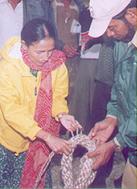What is India doing to protect the Asian elephant?
Assam is home to more than half of India's 10,000 elephants. It has the world's largest concentration of Asiatic elephants.
To increase awareness about wildlife and reduce "tension between elephants and man", Assam celebrated a two-day elephant festival from January 12-13, at Mihimukh near Kaziranga National Park.
 The decision to celebrate such a festival was taken after growing attacks on elephants and the death of five elephants in the state's Sonitpur district in October last year.
The decision to celebrate such a festival was taken after growing attacks on elephants and the death of five elephants in the state's Sonitpur district in October last year.
They were killed by farmers whose standing crops and property were destroyed by the rampaging elephants.
The U.S. Fish and Wildlife Service, a leading organization of the United States has decided to sanction $30,000 for conservation of elephants of the State. The funds have been sanctioned for the two project - Kaziranga National Park and Digboi area. The
organization has been extending financial assistance for conservation of wildlife which are facing extinction due to depletion of forest cover.
The state government announced an award of U.S.$200 ( Rs 10,000) for information that could be helpful in saving elephants from being poisoned or that could lead to the arrest of persons guilty of killing them.
Disturbances created in the natural habitat of elephants at Jharkhand and Orissa by encroachment, cutting of trees, and other human activities prompted these wild elephants to migrate to Chhattisgarh. Rogue elephants claimed 30 lives here.
Chhattisgarh government's 'Operation Tuskers', launched under Parbati Barua aims to secure the state's borders against the menace of wild elephants coming in from outside its borders. Parbati Barua, has already caught one wild male elephant with the help
of tranquilizer guns and Barua's two trained elephants ( koonkies). The plan is to catch and train four wild elephants and drive away the rest to their original habitat. ( Photograph shows Parbati Barua teaching a mahout how to use the rope noose to catch
the wild tusker. )
Are captive elephants also "Wild"?
The elephant is genetically designed to be naturally wild even after domestication . A domesticated elephant may appear to be tame, but instinctive compulsions will inevitably drive it to exhibit its inherent wild side often passively and occasionally in
a more violent manner.
According to S.S. Bist, director of Project Elephant, India, there is a tendency to dismiss the domesticated elephants as another category of cattle and this could be the reason why domesticated elephants have not received due attention from conservationists
despite the fact that are also classified under schedule-1 of the Wildlife Protection Act. In fact, under the Act, domestication has been permitted in the overall conservation interests of the species, he said. Alarmed by the frequent instances of elephants
running amok and goring mahouts to death, the Kerala government proposed to shortly come out with a set of rules on management and upkeep of captive elephants which will include penal provisions to check maltreatment of the animal.
The rules would be made under the Wildlife (Protection) Act, which currently applied to wild animals only, but a section of the Act would be extended to captive elephants also, he said.
The rules will specify norms to be followed when elephants are paraded during festivals, transported by foot or by vehicles, medical check-up and provision of water,fodder and accommodation and training of mahouts. It will also lay down how to handle them
at times of 'musth', when domestic pachyderms often turn violent.
The rules would prohibit elephants being made to walk more than three hours or 30 km at a stretch. Those taking them for long treks would have to carry reflectors during night in the front and rear of the animal for road safety. Keeping elephants without
being fed sufficiently would be made an offense.